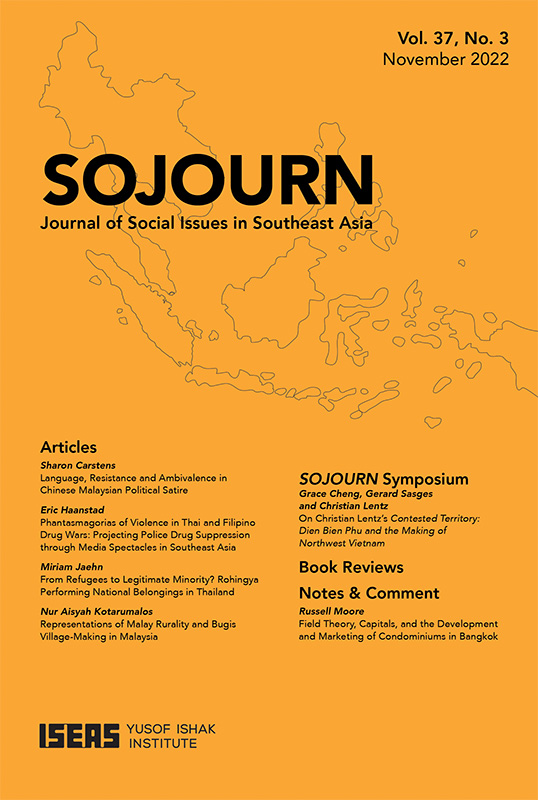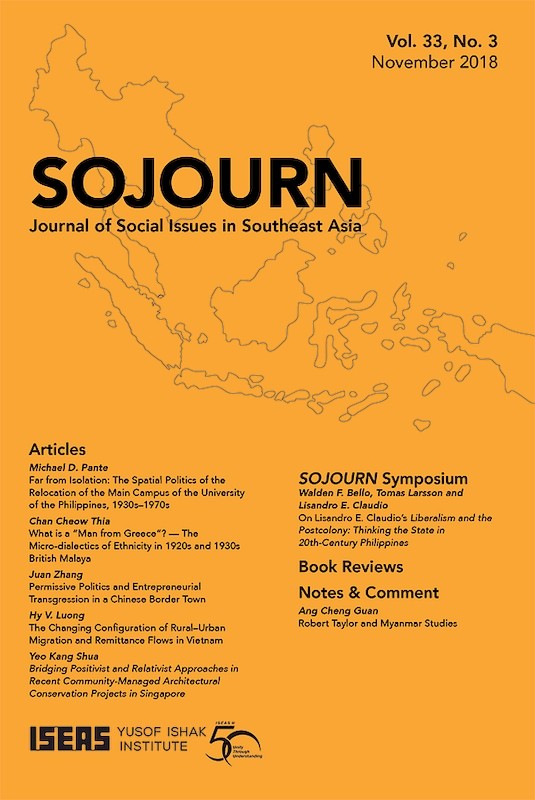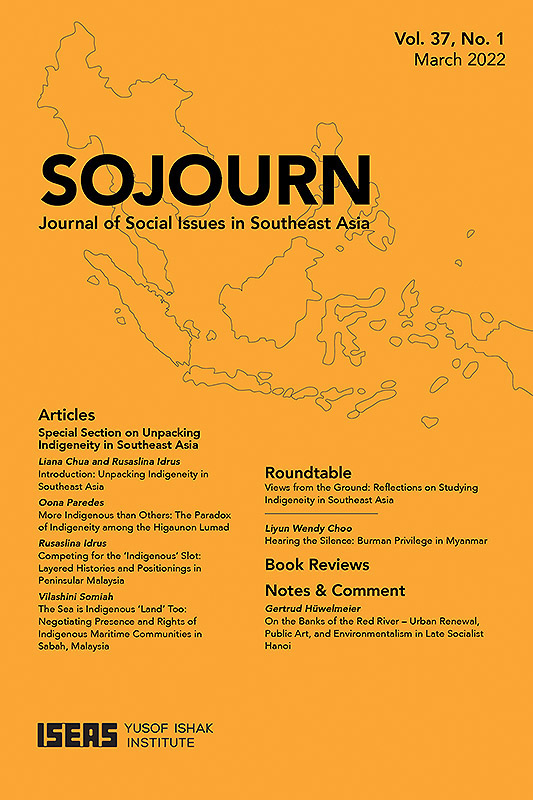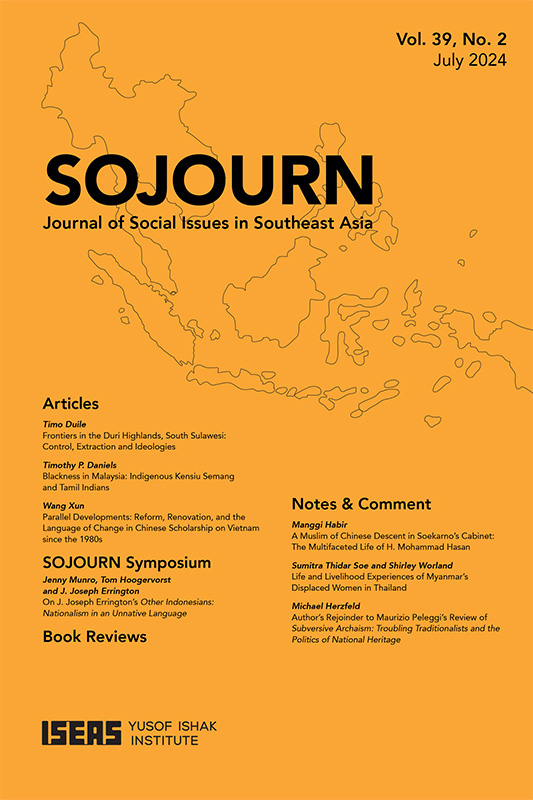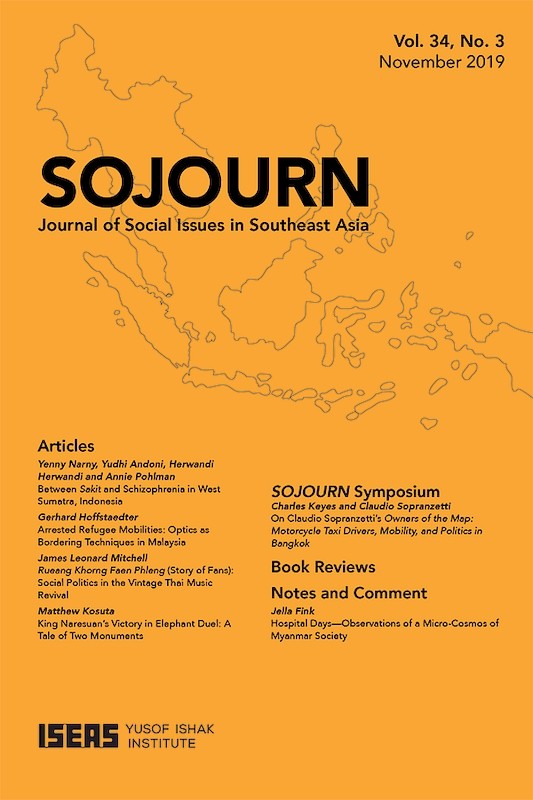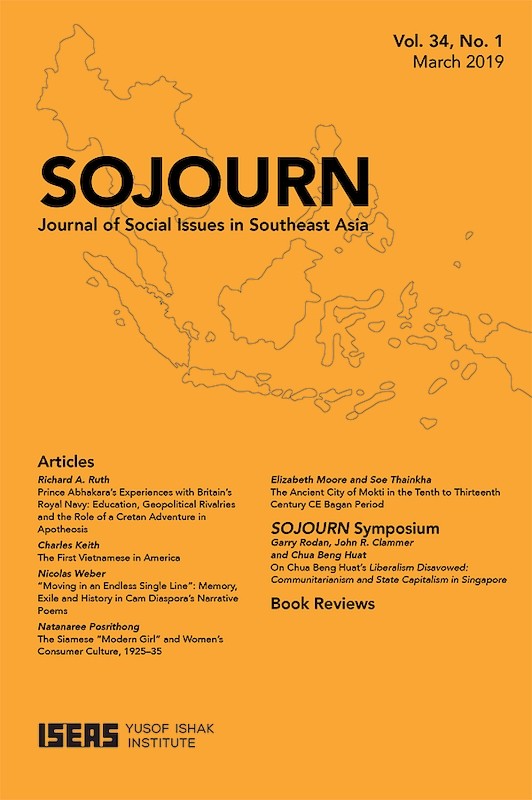SOJOURN: Journal of Social Issues in Southeast Asia Vol. 32/2 (July 2017)
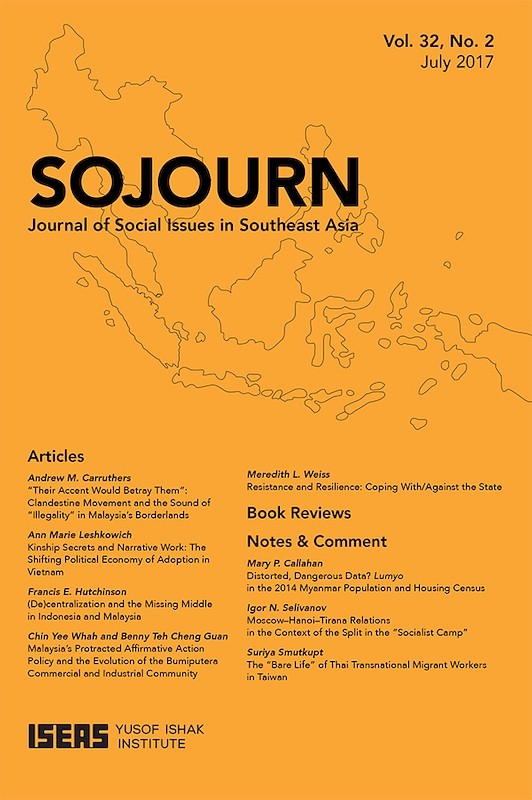
Michael J Montesano, editor
Date of publication:
July 2017
Publisher:
ISEAS – Yusof Ishak Institute
Number of pages:
310
Code:
SJ32/2
Contents
-
SOJOURN: Journal of Social Issues in Southeast Asia Vol. 32/2 (July 2017)
[Whole Publication, ISSN: 17932858] -
Preliminary pages
- ARTICLES
-
Their Accent Would Betray Them: Clandestine Movement and the Sound of Illegality in Malaysia's Borderlands, by Andrew M. Carruthers, author see abstractEthnically Bugis Indonesians have long emigrated from their homeland in Sulawesi to neighbouring Malaysia, where they gained employment as labourers and rapidly assimilated as Malay-speaking Muslim members of the greater "Malay race". Shifting socio-political and economic forces have more recently given rise to narratives that characterize Bugis migrants as an intrusive, displacing and "illegal" presence. The rise of this view has culminated in widespread crackdowns on undocumented immigrants in the East Malaysian state of Sabah. Efforts to police such immigrants have, however, proven difficult because of a practical challenge: Bugis Indonesians are virtually indistinguishable from their co-ethnic Bugis Malaysian counterparts. In response, state agents and concerned citizens have relied on a particular sensory modality <i>hearing</i> or <i>listening</i> — to detect signs of "illegality", as they seek to sort non-citizens from citizens, and effectively police omnipresent yet frustratingly illusory presences.
-
Kinship Secrets and Narrative Work: The Shifting Political Economy of Adoption in Vietnam, by Ann Marie Leshkowich, author see abstractVietnam has a long history of diverse forms of adoption. Yet contemporary domestic adoption remains largely invisible, with families often keeping it secret. The three narratives of secret adoption examined here illuminate the complex dynamics that have naturalized the middle-class biological nuclear family as the ideal for a market economy. As women narratively perform kin-work to make such a family visible and real, they render invisible other relations of blood and desire. Enmeshed in classed, gendered and intimate dynamics of transparency and secrecy, adoptive kinship in Vietnam delineates new subjectivities, affects and forms of political economy.Keywords: adoption, Vietnam, kin-work, narrative, political economy.
-
(De)centralization and the Missing Middle in Indonesia and Malaysia, by Francis E Hutchinson, author see abstractIndonesia and Malaysia have been characterized by powerful, centralized state apparatuses and "soft authoritarianism". However, over the last two decades, Indonesia has implemented far-reaching political reforms and embarked on a process of decentralization, whereas Malaysias political context has remained static, and it has in fact deepened processes of centralization. Notwithstanding this difference, in both cases, the rescaling of state power has occurred at the expense of the meso level — provinces in Indonesia and states in Malaysia. Prevailing conceptualizations of decentralization miss this commonality, as they focus uniquely on the flow of resources and responsibilities away from central governments. Beyond indicating a need for us to sharpen the conceptual tools used in the study of decentralization, this pattern may also tell us something about the nature of state power in post-colonial countries.
-
Malaysia's Protracted Affirmative Action Policy and the Evolution of the Bumiputera Commercial and Industrial Community, by Chin Yee Whah, Ang Cheng Guan, authors see abstractSince 1971, in the context of Malaysias protracted programme of affirmative action, the evolution of the "Bumiputera Commercial and Industrial Community" demonstrates the ways that the state has responded both to the demands of different Malay pressure groups and to external shocks arising from neoliberal globalization. These external factors have compelled the state to deregulate and liberalize. It has thus adopted economic policies that run counter to the goal of promoting the development of a Bumiputera Commercial and Industrial Community. Affirmative action has made immense progress in restructuring Malay society, as seen not least in the emergence and consolidation of a Bumiputera Economic Community.
-
Resistance and Resilience: Coping With/Against the State, by Meredith L Weiss, author see abstractSoutheast Asia offers a bewildering panoply of forms and outcomes of social resistance contra the state. At the same time, regimes across the region are variously disposed towards challenges made through "official" channels. The result is a spectrum of contained and transgressive, broad-based and narrowly waged, permitted and suppressed, and successful and failed protest. What determines how activists and advocates pitch their claims, and how does venue shape content? A comparative examination of spaces and forms of engagement in the region, building on the work of Garry Rodan and Kanishka Jayasuriya to develop a typology of regimes and modes of engagement, serves to address these questions. That framework allows deeper consideration of the dynamics behind demands, identities and strategic choices than studies of contentious politics and statesociety relations usually accommodate. It makes possible exploration of how prevailing parameters determine which issues and identity categories gain traction, what resources and alliances are most germane, and where the balance between electoral and less institutional modes of engagement falls. Examples from a selection of cases from more and less democratic regimes in Maritime Southeast Asia allow us to probe these dynamics in greater depth. This probing in turn permits consideration of dimensions of framing and brokerage, of co-optation and contestation, and of the logic behind activists' strategic decisions of how best to take on a less than liberal state.
- BOOK REVIEWS
-
BOOK REVIEW: Vietnam: A New History, by Christopher Goscha, by Keith W Taylor, author
-
BOOK REVIEW: The Origins of Ancient Vietnam, by Nam C. Kim, by Stephen O'Harrow, author
-
BOOK REVIEW: Deathpower: Buddhism's Ritual Imagination in Cambodia, by Erik W. Davis, by John A Marston, author
-
BOOK REVIEW: The Political Economy of Schooling in Cambodia: Issues of Quality and Equity, edited by Yuto Kitamura, D. Brent Edwards Jr., Chhinh Sitha, and James H. Williams, by Phan Le Ha, author
-
BOOK REVIEW: Opposing the Rule of Law: How Myanmar's Courts Make Law and Order, by Nick Cheesman, by Lynette J Chua, author
-
BOOK REVIEW: Blood, Dreams and Gold: The Changing Face of Burma, by Richard Cockett, by Ardeth Thawnghmung, author
-
BOOK REVIEW: Islam and the Making of the Nation: Kartosuwiryo and Political Islam in 20th Century Indonesia, by Chiara Formichi, by Greg Fealy, author
-
BOOK REVIEW: Rebranding Islam: Piety, Prosperity, and a Self-Help Guru, by James Bourk Hoesterey, by Norshahril Saat, author
-
BOOK REVIEW: Food, Foodways and Foodscapes: Culture, Community and Consumption in Post-Colonial Singapore, by Lily Kong and Vineeta Sinha, by Nir Avieli, author
-
BOOK REVIEW: Tropical Renditions: Making Musical Scenes in Filipino America, by Christine Bacareza Balance, by Antonio T Tiongson, Jr., author
-
BOOK REVIEW: Cities in Motion: Urban Life and Cosmopolitanism in Southeast Asia, 1920–1940, by Su Lin Lewis, by Michael J Montesano, author
- NOTES & COMMENT
-
Distorted, Dangerous Data? Lumyo in the 2014 Myanmar Population and Housing Census, by Mary Callahan, author see abstractAlthough Myanmar undertook its first census in thirty-one years in 2014, the governments of President Thein Sein and State Counsellor Aung San Suu Kyi have withheld the ethnicity statistics polled in the enumeration. The Ministry of Immigration and Population and the United Nations Population Fund framed the census question on ethnicity— or "<i>lumyo" </i>—to fail to produce reliable data, given that it neither met international standards nor took into account the complex and politically charged landscape of ethnicity in Myanmar. As a result, the ethnic results of the 2014 Population and Housing Census came to be viewed as destabilizing to the political reform and peace processes.
-
Moscow–Hanoi–Tirana Relations in the Context of the Split in the Socialist Camp, by Igor N Selivanov, author see abstractDeclassified documents from Russian archives and official Vietnamese and Albanian materials and memoirs permit consideration of the under-studied topic of relations between the Soviet Union and the ruling Communist regimes in Albania and Vietnam and of Albanian–Vietnamese bilateral relations in the context of the two countries relations with the USSR and with the Peoples Republic of China. The split in the international Communist movement from the late 1940s onward meant that, in the early 1960s, the Chinese Communist leadership set out to create a counterweight to Moscow composed of "the true Marxist-Leninist parties". Hanoi and Tirana had to define their places in this SinoSoviet confrontation. Hanoi maintained normal relations with both Moscow and Tirana until the end of the 1980s, despite the severing of all bilateral ties between the Soviet Union and Albania in the early 1960s.
-
The "Bare Life" of Thai Transnational Migrant Workers in Taiwan, by Suriya Smutkupt, author see abstractIn 2009, in an area of Taiwan distinguished by family-operated factories, a young Thai fell victim to sudden unexplained death syndrome. His Indonesian female lover may have been an indirect cause of his death, as her previous lover may have paid for the use of black magic against him. The victim's older brother originally wanted to seek revenge, but his ageing mother dissuaded him. The brother was, in turn, involved with an Indonesian woman in Taiwan, whose child by him he continued to support after her return home. This loyalty led his Taiwanese lover to stab him in his sleep. While he survived, these episodes serve to illustrate the lives and losses of Thai and other transnational migrant workers.

